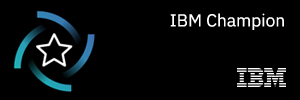Mike Davison

Mike Davison has worked on IBM equipment in IT Operations since starting on the 4381 running VM/VSE as a trainee Operator in 1987. He's worked for blue-chip companies in global data centres and has a varied 30+ years’ experience of IBM i, AIX, VIOS, Linux, storage and disaster recovery. Currently a Senior Technical Consultant for Fortra, Mikes main role is to provide consultancy and support for customers seeking to secure, monitor and automate their Power system operations. He was named an IBM Champion in 2024.
Check Out Mike's recent blog post with Fortra's Tripwire to get his insights on what you need to know to combat malware on Power Systems.
Q & A with Mike
What’s the most interesting or impactful project that you’ve had the chance to work on, whether it's with a customer or internally developing products?
That would have to be the support that I provide for Powertech Antivirus customers across all platforms that I started a few years ago. I'm now an expert on that product and I'm working with some very large customers globally to help them architect and implement Powertech Antivirus into their environment. I help new customers understand how the solution works, I then demo Powertech Antivirus, and I support them in installing and testing the solution. And finally, I serve as a resource for them once the solution has been implemented.
I find it fulfilling that I get to assist the customer throughout their entire journey, beginning with their initial interest in the product all the way through post-implementation support. They’re familiar with me and they entrust me to assist them with mission critical activities like securing their data and ensuring compliance with regulatory requirements – which solves a problem where no other solution exists specifically around AIX and IBM i in the market.
From your experience, what is the biggest barrier holding customers back from strengthening their security?
I would have to say a lack of skills is a major contributor. In fact, it usually tops out in Fortra’s annual IBM i Marketplace Survey. Cybersecurity is a top concern amongst IT personnel yet there’s up to 3 million cybersecurity vacancies globally now and the lack of skills is what often prevents customers from moving forward or getting the right people. Ultimately, many organizations continue on with shaky security or they fill that gap with vendors such as ourselves.
What changes do you foresee in the world of cybersecurity in the coming years?
Quite honestly, I think it's only going to get worse. Cyber attacks are going to continue to become more prevalent. You see the story in the news nearly every week – a company goes bust because they were struck by ransomware. One recent example comes to mind where a large casino lost nearly $100 million. In the last two years, these sorts of events have just exploded and they’re no longer specific to any industry or target.
It doesn't matter if you're a a little flower shop with a P.C. on the Internet or you're a multinational company. The threat actors no longer care. And there's more ways to carry out attacks with new exploits popping up every single day. One target that is expected to grow in its share of attacks is Linux. Obviously, Linux makes up a vast proportion of the cloud. In the past where we’ve seen viruses and malware for X86 on Intel platforms for Windows, we’re now seeing an increase of viruses and malware designed to run on Linux. Roughly 33% of all new viruses are being written specifically to run on a Linux based operating system.
How has the cybersecurity landscape changed since you got your start?
Prior to getting into cybersecurity, my career was IT operations. So I've been a System Administrator for the majority of my working life, working on a variety of platforms but primarily IBM Power. The landscape has changed immeasurably. Five years ago, having a Security Operations Centre (SOC) or Network Operations Centre (NOC) was not the norm. Only the big managed service providers had those. The big banks, big manufacturers, they've all got lots of cybersecurity personnel now. I’ve seen quite an up uptick in regulatory compliance, where somebody who previously might not have been affected by certain regulatory requirements are adopting those just because they’re a good framework. They're protecting themselves for GDPR, PCI, SOX, etc.
More and more customers are wanting to ensure their systems are configured correctly and they are staying configured correctly. They've either got people doing those checks or they're buying automated software to enable them to do that. If you go back eight or nine years to when I was working in the insurance industry, we would be doing those checks every six months. That’s just not good enough nowadays. You need to do those sorts of checks weekly if not daily to ensure that your configurations haven’t changed.
Have you had any experience working with a customer that was in the midst of, or recovering from, a ransomware attack?
Very much so, yes. Just recently, a customer of ours who is a managed service provider had a ransomware attack on one of their customer machines and it was blocked by Powertech Antivirus. Our software did its job, which was great. They called us in a panic, telling us what had happened and asking, “What do we do?” There was nothing else that they needed to do though. Powertech had stopped the attack with no damage being done. Stories like these happen on a semi-regular basis. We’ve had other prospective customers find viruses on their systems that had been lurking there for years while performing a proof of concept of Powertech Antivirus.
